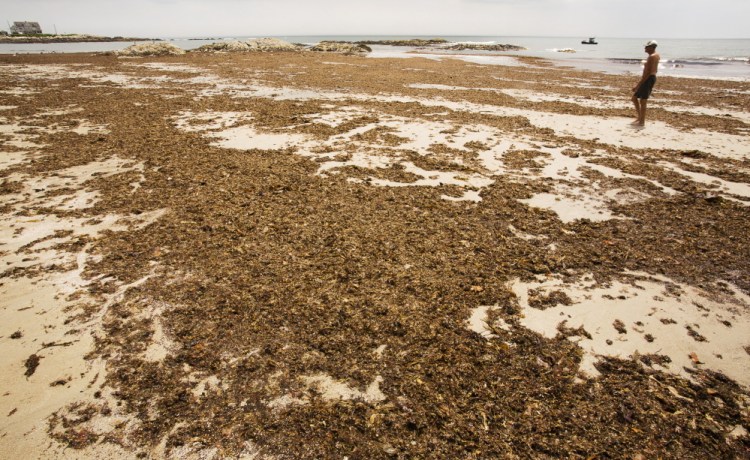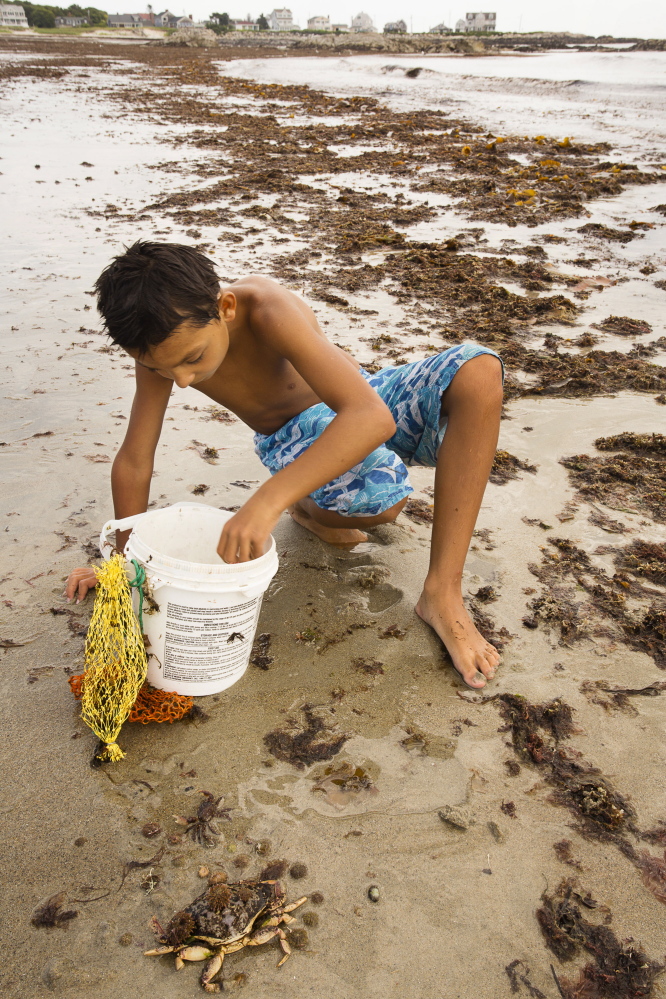BIDDEFORD — Vacationers and residents looking forward to a stroll on the sandy shore of Biddeford Pool are encountering an unpleasant surprise – a blanket of brown seaweed left behind by a late June storm.
The city, responding in part to complaints on social media, is hoping to remove the seaweed from the popular beach, something it has never had to do before. But first it needs state permission, which could take several weeks, because of the potential harm the work could have on the coastal dune system and dune vegetation.
The seaweed – far more than locals remember seeing in recent years – covered much of Bathhouse Beach in Biddeford Pool following a storm on June 28, leading to a slew of complaints as the beach season kicked into high gear.
Officials have spent the last week fielding phone calls, emails and Facebook comments from residents and visitors who would rather stretch out on the sand. On Facebook, a city councilor dubbed it “Seaweedgate.”
“It’s a beautiful beach and a lot of people use it. There’s still room for people to sit, but the real issue is walking through this stuff to get to the water,” said Guy Casavant, the city’s public works director. “There has been quite a bit of public interest in this situation. They’re certainly wondering why nothing was being done.”
Casavant, who has worked for the city for 30 years, said he has seen large amounts of seaweed on the sandy beach from time to time, but the city has never attempted to secure permission to remove it. In fact, Biddeford would have to rent beach raking equipment from nearby Old Orchard Beach because it doesn’t have its own. The potential cost of the cleanup is not known.
In an application submitted Tuesday to the Maine Department of Environmental Protection, Biddeford officials outlined a proposal to use the equipment to remove seaweed and minimize the amount of sand that is disturbed. The seaweed would be composted and turned into fertilizer.
The DEP has not yet received and reviewed the application, department spokesman David Madore said. Once it is received, staff members will review the request and consider issues, such as whether the cleanup would disrupt dune vegetation.
The seaweed deposit appears to be an isolated phenomenon. No other southern Maine towns have recently requested a permit to remove seaweed.
On Wednesday afternoon, a lifeguard watched over Bathhouse Beach as about two dozen people waded in the water or sat under umbrellas. Ten yards away, seaweed coated the sand from the dunes to the water.
The seaweed on the 800-foot stretch of public beach is predominately fine algae, but also includes long strands of kelp attached to clumps of mussels.
“We’re not happy it’s here, but because we’re here, we’ll take it,” Kathy Yee of Goffstown, New Hampshire, said from under an umbrella. “We’ve never seen it like this before.”
The seaweed may seem excessive to some, but the volume pales in comparison to the piles of rockweed that washed onto Scarborough Beach after a similar storm three years ago. Officials there were left to deal with waist-deep piles of rotting seaweed dotted with trash and driftwood.
A “Seaweed Update” recently posted on Facebook by Mayor Alan Casavant sparked nearly 200 comments and a debate about whether the seaweed should be hauled away. Some argue the season is too short to lose beach space, but others say the city should let nature take its course and allow the algae to wash away over time.
Fred Lewis, who was visiting the Biddeford beach from New Hampshire on Wednesday, said it’s the most seaweed he’s ever seen during his visits, but it didn’t bother him. His 4-year-old son likes to poke through the seaweed to look for mussels and crabs, he said.
Cory Samble, a visitor from Oklahoma, wasn’t fazed by the seaweed as he walked along the water’s edge. He said the pungent smell from the seaweed that hung in the air earlier in the week dissipated as some of the algae washed back out to sea.
“It’s nature,” he said. “It’s already going in the other direction.”
Public works director Guy Casavant said it could be several more weeks before the city knows if it can remove the seaweed. And then the city would have to make arrangements to rent equipment from Old Orchard Beach at a yet-to-be determined cost.
That is, he added, “if the tides don’t take it away by the time this all happens.”
Send questions/comments to the editors.





Success. Please wait for the page to reload. If the page does not reload within 5 seconds, please refresh the page.
Enter your email and password to access comments.
Hi, to comment on stories you must . This profile is in addition to your subscription and website login.
Already have a commenting profile? .
Invalid username/password.
Please check your email to confirm and complete your registration.
Only subscribers are eligible to post comments. Please subscribe or login first for digital access. Here’s why.
Use the form below to reset your password. When you've submitted your account email, we will send an email with a reset code.